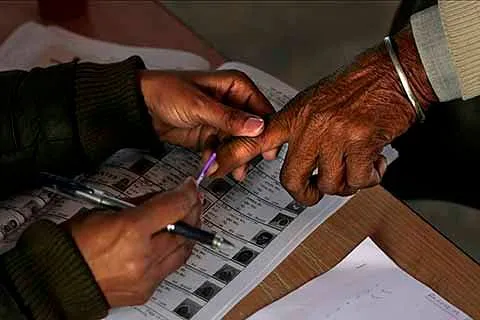In an unprecedented move, the election commission of India (ECI) Sunday announced that it would hold elections in the restive Anantnag parliamentary segment in southern Kashmir in three phases. Spread over four districts, the southern Kashmir parliamentary seat—where the authorities had failed to hold the parliamentary by-election in 2017—will now witness polls in three phases in the upcoming LokSabha elections beginning April 11.
This is for the first time that the election is being held fora parliamentary segment in three phases.
The ECI announcement about the southern parliamentarysegment created confusion in the state’s mainstream political circles until itbecame clear that the polls will be held there in three phases.
Even the former chief minister Omar Abdullah and formerfinance minister HaseebDrabu were left perplexed.
“Something is wrong with this announcement. The ECI hascounted 7 or 8 LS seats for my state but J&K only has SIX seats.#confused,” Omar tweeted.
“Has there been a delimitation of parliamentaryconstituencies through a Presidential Order?! Election Commission has announced election schedule for 8 seats:
Phase 1: J&K-2; PHASE 2: J&K-2; PHASE 3: J&K-1; PHASE 4: J&K-1; PHASE 5: J&K-2.
The last time I checked J&K had only 6 seats!,” Drabutweeted.
The southern Kashmir has shown a cold response to electoralpolitics following the 2016 uprising.
During the recently-held local body elections, the regionwitnessed a near-total boycott of the electoral exercise.
The southern Kashmir districts have witnessed a spurt inlocal youth joining militancy and civilian protests following the killing ofHizbulMujahideen commander BurhanWani in 2016.
On May 1, 2017, the ECI deferred the by-election forAnantnag parliamentary seat, saying that “free and fair poll is not possibledue to prevailing ground situation and non-availability of sufficient securityforces.”
This was the second time when the authorities could not holdthe parliamentary election in the state.
On 18 April 1991, the President of India had promulgated theRepresentation of People (Amendment) Ordinance to enable the ECI to conduct LSelections without taking into account the parliamentary constituencies ofJ&K.
Subsequently, the Parliament passed “The Representation ofthe People (Amendment) Act” to replace the Ordinance.
The Muslim United Front, a coalition of parties formed in1987 to take on NC-Congress combine, won three seats from the region out offour seats it got in the Valley. The MUF candidates emerged victorious onAnantnag, Homeshalibug and Kulgam assembly segments of the region.






